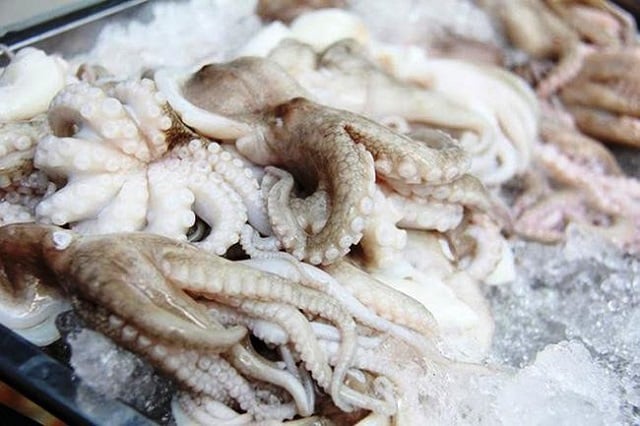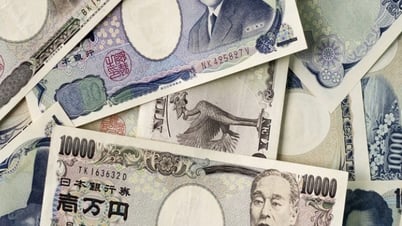| Export of squid and octopus: Bright spot from the Japanese market. South Korea is still the largest import market for squid and octopus from Vietnam. |
According to statistics from the Vietnam Association of Seafood Exporters and Producers (VASEP), Vietnam's squid and octopus exports in the first month of the year reached 62 million USD, up 45% over the same period last year, a good sign for the seafood industry in early 2024.
In the structure of exported squid and octopus products, squid accounts for 57% of the proportion, reaching 35 million USD, while octopus accounts for 43%, reaching 27 million USD.
South Korea has been the largest market for Vietnamese squid and octopus for many years, and recorded strong growth in January. Specifically, our country exported this item to South Korea reaching 26 million USD, an increase of 67% over the same period last year.
 |
| South Korea is Vietnam's largest export market for squid and octopus, reaching 26 million USD. |
Japan's nuclear waste discharge has had an impact, reducing South Korea's demand for seafood imports from Japan. South Korea has not issued a ban on seafood imports from Japan, but has increased inspections of goods from Japan.
In addition, China is the largest supplier of squid and octopus to Korea. China's ban on seafood imports from Japan has also reduced the supply of squid and octopus from China to markets such as Korea due to a shortage of raw materials for processing.
Vietnam's squid and octopus exports to South Korea are expected to continue to grow positively in the first quarter of 2024 as the ban on Japanese seafood imports to China has not been lifted.
According to data from the International Trade Center (ITC), in January this year, South Korea's squid and octopus imports from all sources also increased by 5%, reaching 91 million USD. Vietnam is the second largest supplier of squid and octopus to South Korea, after China.
Exports of squid and octopus to Japan (Vietnam's second largest squid and octopus import market) recorded a lower growth rate than the Korean market, up 19% to 13 million USD. The nuclear wastewater discharge had a negative impact on Japan's overall seafood import and export. After the nuclear wastewater discharge, Japan's squid and octopus imports from Vietnam decreased significantly.
China and Hong Kong are the third largest import markets for squid and octopus from Vietnam. Squid and octopus exports to this market in January this year grew impressively by 3 digits with 151% reaching 7 million USD. China's ban on seafood imports from Japan after Japan's nuclear waste discharge into the sea has caused China to increase imports from other sources, including Vietnam. In addition, this market increased imports of squid and octopus from Vietnam in January this year to serve the consumption demand for Lunar New Year.
Vietnam’s squid and octopus exports to the EU in January this year still could not escape negative growth. The EU is also the only market among the top major markets importing squid and octopus from Vietnam to record negative growth.
Vietnam's squid and octopus exports to this market decreased by 17%, reaching nearly 4 million USD in the first month of this year. Squid and octopus exports to the EU are still affected by the IUU yellow card, many new regulations, procedures for certification and certification for exports to this market are still inadequate, and people's spending is tightening due to inflation.
In 2023, Vietnam's squid and octopus exports will reach 660 million USD, down 13% compared to 2022, with export turnover to South Korea reaching 247 million USD, down 8% compared to 2022.
Source


![[Photo] General Secretary To Lam meets and expresses gratitude to Vietnam's Belarusian friends](https://vphoto.vietnam.vn/thumb/1200x675/vietnam/resource/IMAGE/2025/5/11/c515ee2054c54a87aa8a7cb520f2fa6e)

![[Photo] General Secretary To Lam concludes visit to Russia, departs for Belarus](https://vphoto.vietnam.vn/thumb/1200x675/vietnam/resource/IMAGE/2025/5/11/0acf1081a95e4b1d9886c67fdafd95ed)

![[Photo] General Secretary To Lam arrives in Minsk, begins state visit to Belarus](https://vphoto.vietnam.vn/thumb/1200x675/vietnam/resource/IMAGE/2025/5/11/76602f587468437f8b5b7104495f444d)

























![[Photo] National Assembly Chairman Tran Thanh Man attends the Party Congress of the Committee for Culture and Social Affairs](https://vphoto.vietnam.vn/thumb/1200x675/vietnam/resource/IMAGE/2025/5/11/f5ed02beb9404bca998a08b34ef255a6)
































































Comment (0)